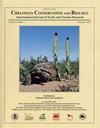Long-Term Trends in Ringed Sawback (Graptemys oculifera) Growth, Survivorship, Sex Ratios, and Population Sizes in the Pearl River, Mississippi
IF 0.8
4区 生物学
Q3 ZOOLOGY
引用次数: 6
Abstract
Abstract Effective management of long-lived species requires demographic and life-history data that are best acquired from long-term studies. The ringed sawback (Graptemys oculifera), endemic to the Pearl River watershed of Mississippi and Louisiana, is a species of management concern at both the state and federal levels. Population sizes, trapping success, basking counts, sex ratios, survivorship, and growth of this species were investigated at 5 sites on the Pearl River in Mississippi over a 25-yr period. Estimates of age at maturity were 4.6 yrs for males and 9.1 yrs for females. Mean annual survivorship estimates for males, females, and juveniles were 0.88, 0.93, and 0.69, respectively. Maximum longevity estimates were 48.8 yrs for males and 76.4 yrs for females. Average longevity estimates were 8.5 yrs for males and 13.9 yrs for females. The sex ratio of captured turtles was male-biased before 2000 but unbiased after 2000. Realized population growth estimates indicated that 4 populations were stable over the 25-yr period and 1 population had declined. Population estimates and basking counts trended downward through time at most sites. Trapping success after 2000 for all sites combined declined by 77%, 45%, and 25% for juveniles, males, and females, respectively. Taken together, these data indicate that 1 population of G. oculifera has declined, 3 appear to be in the initial stages of decline, and 1 is relatively stable. Additional monitoring of these populations will be necessary to determine if these trends continue into the future.密西西比州珠江地区环锯鳐(Graptemys oculifera)生长、存活、性别比例和种群规模的长期趋势
对长寿物种的有效管理需要从长期研究中获得最好的人口统计和生活史数据。环锯木(Graptemys oculifera)是密西西比州和路易斯安那州珠江流域的特有物种,是州和联邦一级管理关注的物种。在25年的时间里,我们在密西西比州珠江流域的5个地点调查了该物种的种群规模、捕获成功率、日照次数、性别比例、存活率和生长情况。成年年龄估计男性为4.6岁,女性为9.1岁。雄性、雌性和幼鱼的平均年生存率分别为0.88、0.93和0.69。男性的最大寿命估计为48.8岁,女性为76.4岁。男性的平均寿命估计为8.5岁,女性为13.9岁。在2000年之前,捕获海龟的性别比例为雄性偏倚,而在2000年之后则无偏倚。已实现的人口增长估计表明,在25年期间,有4个种群保持稳定,1个种群下降。在大多数地点,随着时间的推移,种群估计和日光浴数量呈下降趋势。2000年以后,所有地点的捕获成功率分别下降了77%、45%和25%,分别是幼鱼、雄鱼和雌鱼。综上所述,1个种群数量已经下降,3个种群数量处于下降初期,1个种群数量相对稳定。有必要对这些人口进行进一步监测,以确定这些趋势是否会持续到未来。
本文章由计算机程序翻译,如有差异,请以英文原文为准。
求助全文
约1分钟内获得全文
求助全文
来源期刊
CiteScore
1.70
自引率
14.30%
发文量
17
审稿时长
>12 weeks
期刊介绍:
Chelonian Conservation and Biology is a biannual peer-reviewed journal of cosmopolitan and broad-based coverage of all aspects of conservation and biology of all chelonians, including freshwater turtles, marine turtles, and tortoises. Manuscripts may cover any aspects of turtle and tortoise research, with a preference for conservation or biology. Manuscripts dealing with conservation biology, systematic relationships, chelonian diversity, geographic distribution, natural history, ecology, reproduction, morphology and natural variation, population status, husbandry, community conservation initiatives, and human exploitation or conservation management issues are of special interest.

 求助内容:
求助内容: 应助结果提醒方式:
应助结果提醒方式:


